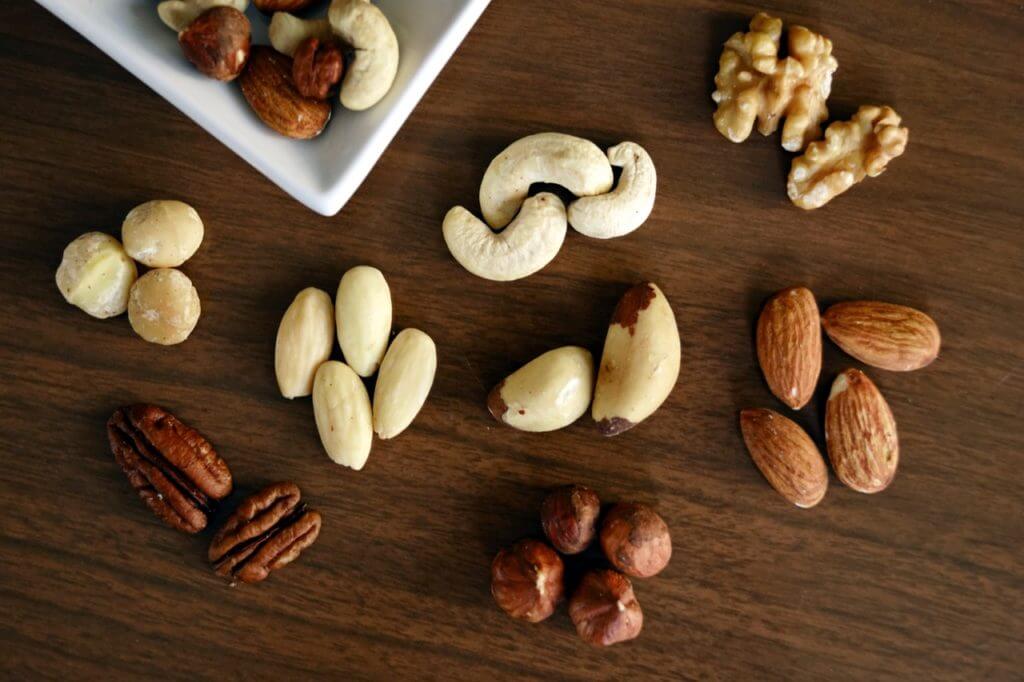Peanuts may not technically be nuts, but they have a lot in common with them.
This short post compares the nutrition, omega fat content, and protein of both common plant protein sources.
Note that all data on this page is per 100 gram serving.
Table of Contents
Nutritional Value Comparison of Almonds and Peanuts
The main reason that peanuts are often lumped in with nuts despite being legumes is because their nutritional profile is quite similar to most nuts.
| Almonds | Peanuts | |
|---|---|---|
| Energy (kcal) | 579.6 | 567.1 |
| Protein (g) | 21.1 | 25.8 |
| Total Lipid (g) | 49.9 | 49.2 |
| Carbohydrate (g) | 21.6 | 16.1 |
| Fiber (g) | 12.6 | 8.5 |
| Sugars (g) | 4.4 | 4.7 |
The amount of calories, fat, and sugars in peanuts and almonds are almost identical.
There are only a few small differences:
- Peanuts have about 22% more protein than almonds per 100 gram serving.
- Almonds have more fiber, but also more carbohydrates. Overall they have similar levels of net carbohydrates.
Omega 3 and 6 Fat Ratios of Almonds and Peanuts

While nuts have a good amount of protein and nutrients, they unfortunately have a lot of omega 6 fats, which is something that most people get way too much of already.
Ideally, you want to have an omega 6 to 3 fat ratio as small as possible (under 4 is generally considered ideal).
| Almonds | Peanuts | |
|---|---|---|
| Omega 3 Fats | 0.052 | 0.01 |
| Omega 6 Fats | 14.5 | 17.2 |
| Omega 6:3 Ratio | 278.85 | 1720.00 |
Peanuts actually have the worst omega 3 to 6 fat ratio of any “nut.”
Almonds also have a terrible omega fat ratio with a similar level of omega 6 fats, but slightly more omega 3 fats.
Neither almonds or peanuts have good omega 3 to 6 fat ratios. That doesn’t mean they shouldn’t be included in a diet, just that they shouldn’t be eaten in particularly large quantities.
Vitamins and Minerals of Almonds and Peanuts
Next let’s look at all the other nutrients that are packed into these protein sources.
I’ve included a column with a general RDA. This is just a reference as it varies from person to person, but gives us a way to sort the amount of nutrients.
| RDA | Almonds | Peanuts | |
|---|---|---|---|
| Vitamin E (mg) | 15 | 25.6 | 8.3 |
| Manganese (mg) | 2.3 | 2.2 | 1.9 |
| Riboflavin (mg) | 1.3 | 1.1 | 0.1 |
| Niacin (mg) | 16 | 3.6 | 12.1 |
| Phosphorus (mg) | 700 | 481.5 | 375.3 |
| Magnesium (mg) | 400 | 270.4 | 168.5 |
| Folate (µg) | 400 | 44.4 | 239.7 |
| Thiamin (mg) | 1.2 | 0.2 | 0.6 |
| Potassium (mg) | 2000 | 733.3 | 705.5 |
| Zinc (mg) | 11 | 3.1 | 3.3 |
| Vitamin B-6 (mg) | 1.3 | 0.1 | 0.3 |
| Iron (mg) | 18 | 3.7 | 4.6 |
| Calcium (mg) | 1200 | 268.5 | 91.8 |
| Selenium (µg) | 55 | 4.1 | 7.3 |
| Choline (mg) | 550 | 52.0 | 52.5 |
Overall peanuts and almonds both have a lot of micronutrients and have similar profiles.
There are only a few significant differences:
- Peanuts are much higher in niacin, folate, vitamin B-6, and selenium.
- Almonds are much higher in vitamin E and calcium
Other than arguably calcium, none of these are particularly important (i.e. often lacking in diets), so these differences don’t matter much in practical terms.
Almonds vs Peanuts: Which is Healthier?
Neither almonds or peanuts are clearly healthier. Peanuts do have a bit more protein and vitamins like niacin and folate, but almonds have more fiber and minerals like calcium.
In addition, while both are healthy foods in small amounts, both almonds and peanuts have terrible omega 3 to 6 fat ratios and should be limited in a diet within reason.
Are Almonds or Peanuts Better for Weight Loss?
A 100 gram serving of either peanuts or almonds have an almost identical amount of calories (567 vs 580), so neither is particularly better or worse in terms of creating a caloric deficit for weight loss. However, almonds do have more fiber which can make them more filling if appetite is a problem.
Are Almonds or Peanuts Better for Bodybuilding?
Peanuts are preferable for bodybuilding due to having more protein (26 grams vs 21 grams per 100 gram serving). Both have a similar amount of calories, which is quite high, making them good bulking foods for bodybuilders.
